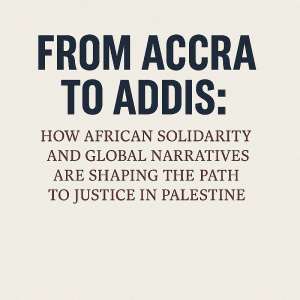
As the world bears witness to deepening tragedy in Gaza and the occupied territories, a new axis of influence is rising—from Accra to Addis, from Lagos to Johannesburg. The conversation is shifting, no longer cloaked in diplomatic euphemisms but ignited by clarity of conscience. Africa is no longer a silent observer. It is, increasingly, a moral compass.
Narrative Power and Policy Shifts
Global narratives are no longer shaped solely by governments or legacy media. They are being co-authored by survivors, students, clergy, and civil society in the Global South.
Legal Milestones: The International Court of Justice’s recent ruling against the occupation has armed policymakers and activists with the language of justice, not neutrality. Digital Diplomacy: Grassroots campaigns are now commanding attention through hashtags and livestreams—redefining how political pressure is applied across borders. Moral Movements: “Justice is what love looks like in public,” wrote philosopher Cornel West—and this ethos is guiding faith institutions and civic actors calling for sanctions and accountability.
Ghanaian and African Voices: Between Principle and Pragmatism
Ghana’s heritage of Pan-African leadership makes silence untenable. While official responses remain cautious, the voices from mosques, churches, lecture halls, and marketplaces are anything but.
Citizen Solidarity: Demonstrators bearing signs that read “From Gold Coast to Gaza, All Oppression Must End” signal that this is not just a foreign policy issue—it’s a moral imperative rooted in shared history. Pan-African Echoes: Algerian lawmakers, South African clergy, and Namibian activists are invoking their own liberation struggles to frame Palestine not as a geopolitical quagmire, but as the unfinished business of global decolonization. Contested Consensus: The African Union walks a delicate line, but its youth and civil society arms are increasingly outspoken—demanding clarity over appeasement.
A Call to Action: Centering Justice in African Diplomacy
If foreign policy is an extension of a nation’s soul, then Ghana and its continental peers must ask: What story are we telling the world?
“We know too well that our freedom is incomplete without the freedom of the Palestinians.” — Nelson Mandela
This is the time for Ghana to lead—not just in peacekeeping but in peacemaking rooted in justice. Let us call for:
An immediate ceasefire and unhindered humanitarian access. Suspension of military and trade agreements that enable oppression. Amplified support for international legal mechanisms investigating war crimes. A unified AU position grounded in anti-colonial values and international law.
The road to justice may be long, but silence is complicity. Africa has the moral authority and historical grounding to speak truth to power. From Accra’s classrooms to Addis’ chambers, from Kigali’s pulpits to Cape Town’s streets—let the call ring clear:
Not in our name. Not on our watch. Not again.
Retired Senior Citizen
Teshie-Nungua
[email protected]


